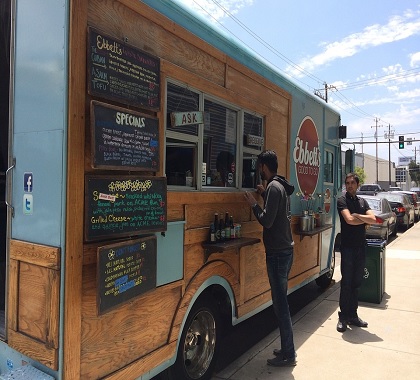Illinois’ First District Appellate Court rejected a legal challenge to the city’s food-truck ordinance.
In December 2017, the state’s First District Appellate Court upheld Cook County Circuit Judge Anna Helen Demacopoulos’ December 2016 ruling against plaintiff Laura Pekarik, a Chicago-area mobile food vendor fighting the city’s food truck ordinance.
A city ordinance prohibits food trucks from operating within 200 feet of a restaurant and restricts the amount of time the trucks may serve customers in a given area. Food truck operators in the city are required to install global positioning system trackers on their vehicles to facilitate enforcement of the law.
Claims Unequal Treatment
Institute for Justice (IJ) Senior Attorney Robert Frommer says the appellate court’s decision effectively endorses discriminatory legal treatment. IJ is a nonprofit public-interest law firm representing Pekarik.
“In upholding Chicago’s rule that prohibits food trucks from operating within 200 feet of any restaurant, the appellate court held that Chicago can discriminate against food trucks because the city believes that restaurants may contribute more in tax revenue,” Frommer said.
The Appellate Court’s ruling conflicts with legal precedent, Frommer says.
“This ruling breaks with decades of precedents, which have repeatedly held that local governments cannot constitutionally ‘legislate economic protection for existing businesses against the normal competitive factors which are basic to our economic system,'” Frommer said, quoting the 1967 Illinois Appellate Court decision in Exchange Nat. Bank v. Village of Skokie. “This ruling threatens to gut economic liberty in Illinois, as it gives cities free rein to line the pockets of their friends by making the competition illegal.”
Curbside Cronyism
Chris Lentino, manager of Chicago outreach for the Illinois Policy Institute, says the Chicago ordinance is an example of regulatory capture.
“In general, cities like Chicago crack down on innovative industries in order to protect entrenched industries,” Lentino said. “These industries, such as the restaurant industry, have spent years and countless dollars lobbying to ensure preferential treatment.”
Lentino says small business owners, including Pekarik, are fighting a rigged system.
“What we end up seeing, as in this case, are lawsuits against the city,” Lentino said. “This is the path of last resort. The food truck operators just want to be heard, to be treated fairly. Unfortunately, the city isn’t willing to listen. Chicago has chosen to impose oppressive restrictions.”




